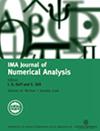Mass, momentum and energy preserving FEEC and broken-FEEC schemes for the incompressible Navier–Stokes equations
IF 2.3
2区 数学
Q1 MATHEMATICS, APPLIED
引用次数: 0
Abstract
In this article we propose two finite-element schemes for the Navier–Stokes equations, based on a reformulation that involves differential operators from the de Rham sequence and an advection operator with explicit skew-symmetry in weak form. Our first scheme is obtained by discretizing this formulation with conforming FEEC (Finite Element Exterior Calculus) spaces: it preserves the point-wise divergence free constraint of the velocity, its total momentum and its energy, in addition to being pressure robust. Following the broken-FEEC approach, our second scheme uses fully discontinuous spaces and local conforming projections to define the discrete differential operators. It preserves the same invariants up to a dissipation of energy to stabilize numerical discontinuities. For both schemes we use a middle point time discretization that preserve these invariants at the fully discrete level and we analyze its well-posedness in terms of a CFL condition. While our theoretical results hold for general finite elements preserving the de Rham structure, we consider one application to tensor-product spline spaces. Specifically, we conduct several numerical test cases to verify the high order accuracy of the resulting numerical methods, as well as their ability to handle general boundary conditions.不可压缩纳维-斯托克斯方程的质量、动量和能量保全 FEEC 和破碎 FEEC 方案
在这篇文章中,我们针对纳维-斯托克斯方程提出了两种有限元方案,这两种方案都是基于德拉姆序列微分算子和具有显式弱形式倾斜对称性的平流算子的重新表述。我们的第一个方案是通过符合 FEEC(有限元外部计算)的空间对这一公式进行离散化而获得的:它保留了速度、总动量和能量的无发散点约束,此外还具有压力稳健性。我们的第二种方案沿用了断裂 FEEC 方法,使用完全不连续空间和局部保角投影来定义离散微分算子。它保留了相同的不变性,直到能量耗散,以稳定数值不连续性。对于这两种方案,我们都采用了中间点时间离散化,在完全离散的水平上保留了这些不变式,并根据 CFL 条件分析了其良好拟合性。虽然我们的理论结果适用于保留 de Rham 结构的一般有限元,但我们考虑了张量乘积样条空间的一个应用。具体地说,我们进行了几个数值测试案例,以验证所产生的数值方法的高阶精度及其处理一般边界条件的能力。
本文章由计算机程序翻译,如有差异,请以英文原文为准。
求助全文
约1分钟内获得全文
求助全文
来源期刊
CiteScore
5.30
自引率
4.80%
发文量
79
审稿时长
6-12 weeks
期刊介绍:
The IMA Journal of Numerical Analysis (IMAJNA) publishes original contributions to all fields of numerical analysis; articles will be accepted which treat the theory, development or use of practical algorithms and interactions between these aspects. Occasional survey articles are also published.

 求助内容:
求助内容: 应助结果提醒方式:
应助结果提醒方式:


